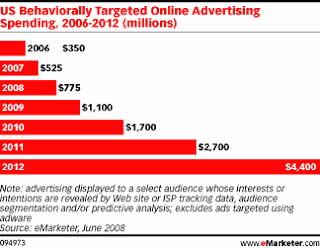My idle thoughts on tech startups
Unleashing the promise of behavioral targeting
I’ve been following the behavioral ad targeting space with interest for a couple years now. Behavioral targeting has of course been around in a variety of forms for a number of years, but one of the more recently publicized incarnations has been launched by ISPs. Cable company Charter Communications came under significant fire for deploying technology from NebuAd, which essentially uses deep packet inspection to monitor all the web surfing of their broadband subscribers and use this data for ad targeting. Today Charter announced they’re abandoning this effort at least for the time being.
 For those who may be less familiar, chances are that your web surfing activity is already being used in some way shape or form to target more relevant content or advertising to you. As the chart to the left indicates, it’s already real dollars (i.e. approaching $1B annually) today and expected to grow rapidly. Onsite targeting, i.e. the pages you visit on one particular website being used to determine what content or ads you’re shown, has been used by web publishers (particularly in e-commerce contexts) for years. Within the last two or three years, ad networks based on observing a user’s surfing across a range of sites started to emerge (Revenue Science, Tacoda – acq by AOL, and Blue Lithium – acq by Yahoo! are the chief examples). ISP driven targeting is even more recent both in the US and in Europe. And the future of behavioral targeting may involve not just the sites or pages a user visits, but the actions they take (posting a photo, commenting about a car you just bought on a social networking site or IM service, etc).
For those who may be less familiar, chances are that your web surfing activity is already being used in some way shape or form to target more relevant content or advertising to you. As the chart to the left indicates, it’s already real dollars (i.e. approaching $1B annually) today and expected to grow rapidly. Onsite targeting, i.e. the pages you visit on one particular website being used to determine what content or ads you’re shown, has been used by web publishers (particularly in e-commerce contexts) for years. Within the last two or three years, ad networks based on observing a user’s surfing across a range of sites started to emerge (Revenue Science, Tacoda – acq by AOL, and Blue Lithium – acq by Yahoo! are the chief examples). ISP driven targeting is even more recent both in the US and in Europe. And the future of behavioral targeting may involve not just the sites or pages a user visits, but the actions they take (posting a photo, commenting about a car you just bought on a social networking site or IM service, etc).
Controversy has surrounded online behavioral targeting essentially since its inception nearly a decade ago when companies like Engage and Doubleclick (famously investigated by the FTC for its “Boomerang” initiative) were trying to pioneer the approach. And this controversy has crescendoed in recent times as the various technologies and ad networks for behavioral targeting have proliferated. At the core of nearly all concerns with behavioral targeting are basic privacy and issues of user control.
In theory, behavioral ad targeting should be a win win win scenario. Advertisers should be able to reach their target audience at lower cost or in higher numbers, web publishers can better monetize their content & services (either sell their inventory at higher rates or get rev share for providing targeting data), and consumers should benefit by seeing ads that are more relevant to them. Companies with behavioral ad networks like AOL have been trying to educate consumers on these very points in order to stave off criticism or even formal regulation.
I’m of the opinion that the best approach may be to turn this controversy on it’s head by putting users at the center of behavioral targeting. Give consumers control (thru a browser plug-in or other means) of when their web surfing can be tracked and when they want to not be watched. In essence you’re always being watched by an ISP or the particular site you’re on unless you’re using some type of proxy, but at least give people as much perceived control as possible. Cut consumers into the economic value chain of behavioral monitoring, either through explicit payments or more likely free/subsidized access to premium content & services. If consumers are “getting” something out of behavioral targeting beyond just seeing fewer crappy and irrelvant ads, perhaps they might be more receptive.
Bottom line… I remain a believer in the underlying promise of a variety of behavioral targeting paradigms. Rather than trying to squelch or dismiss user concerns, however, I suspect that the long term winners here will be those that embrace such concerns at the core of their model. Any takers?
